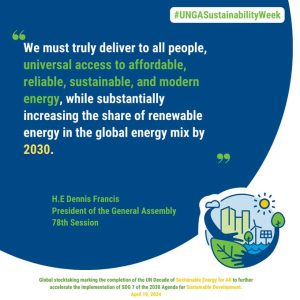
Web Broadcast Link- April 19
Part 1
Web Broadcast Link- April 19
Part 2
Global stocktaking marking the completion of the UN Decade of Sustainable Energy for All to further accelerate the implementation of SDG 7 of the 2030 Agenda for Sustainable Development.
19 April 2024, 10:00 am to 1:00 pm and 3:00 pm to 6:00 pm
General Assembly Hall, UN Headquarters, New York
Objective
In this context, key questions to be addressed include:
- How can ambitions be further increased and implementation be further accelerated?
- How can multi-stakeholder partnerships be scaled up?
- What will be the appropriate institutional arrangements for continuing to advance international cooperation on energy beyond the UN Decade of Sustainable Energy for All?
Further voluntary commitments, including Energy Compacts, will be encouraged in support of closing the energy gap, rapidly transitioning to decarbonized energy systems, addressing energy’s interlinkages, and strengthening partnerships and the means of implementation.
Format
Thematic Debate 1: Closing the energy access gap and transitioning to decarbonized energy systems
675 million people still lack access to electricity. About 2.3 billion people remain without clean cooking solutions, causing millions of premature deaths annually, disproportionally affecting women. Progress towards ensuring universal access to electricity and clean cooking solutions and technology by 2030 will be reviewed and solutions to closing the remaining energy access gap will be discussed.
While the investment in renewables is outpacing the investment in fossil fuel power plants, much more is required to transition away from fossil fuels as the deployment of renewables is lagging especially in transport, industry, heating and cooling. Discussions will centre on the need for accelerated progress on deep energy decarbonization in support of achieving the 1.5°C goal of the Paris Agreement, including through the tripling of renewable energy capacity globally and the doubling the global average annual rate of energy efficiency improvements by 2030, as well as the phase out inefficient fossil fuel subsidies that do not address energy poverty or just transitions.
Thematic Debate 2: Addressing energy’s interlinkages and strengthening means of implementation and partnerships
Progress on SDG7 can produce particularly high co-benefits in other areas of sustainable development, bringing many more development synergies than trade-offs for vulnerable populations. This includes poverty eradication, food security, health, education, prosperity, gender equality, jobs, transport, ocean, water and sanitation, and the empowerment of women and youth. However, co-benefits in these areas do not come about automatically. Discussions will elaborate on cross-sectoral approaches that are required at the level of policy, planning, and implementation. Among other benefits, the implementation of SDG7 could result in millions of new green jobs world-wide.
The need to dramatically scale up international cooperation to catalyse public and private finance and investment to accelerate energy transitions, especially for developing countries as well as vulnerable countries and countries in special situations, including SIDS, LDCs and LLDCs, will be focused on. Discussions will also consider the importance of infrastructure, technology transfer, capacity building and the collection, management and application of data in addressing the digital divide in the energy sector.

